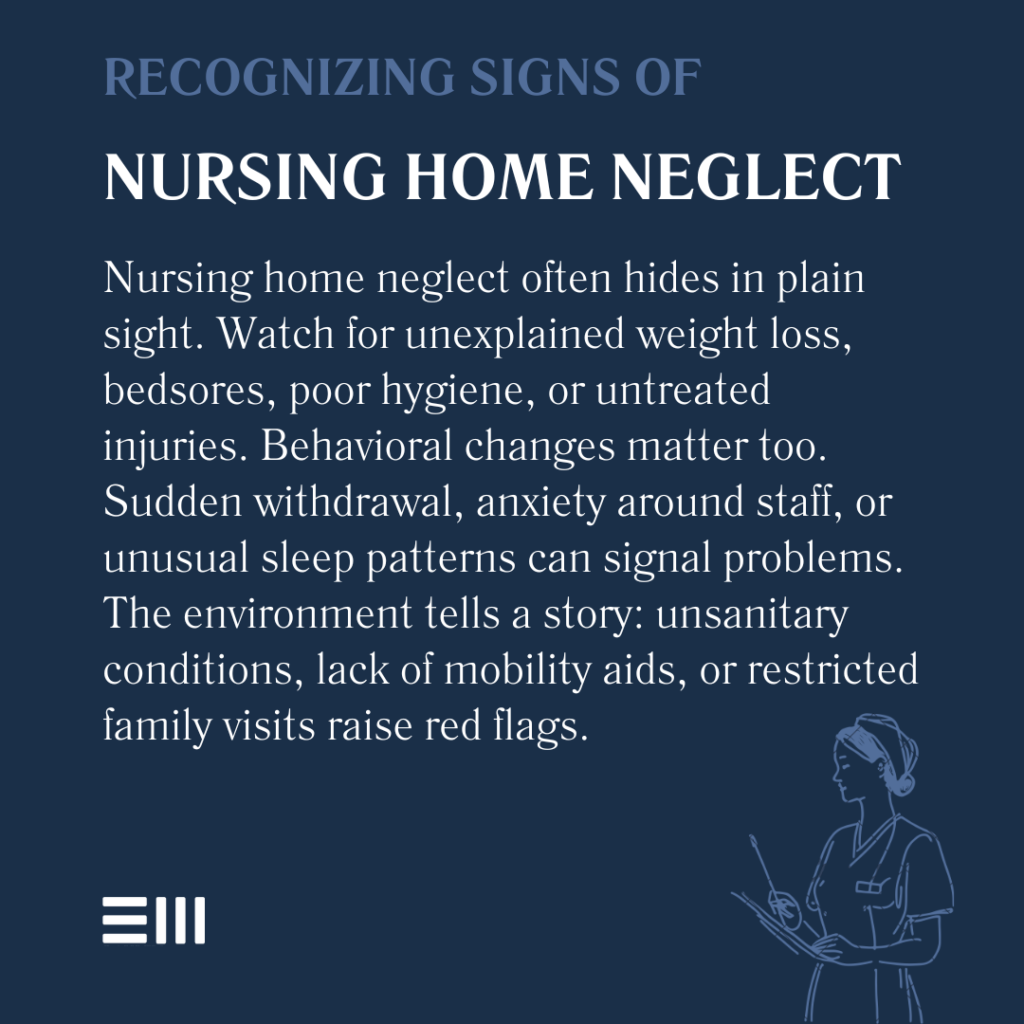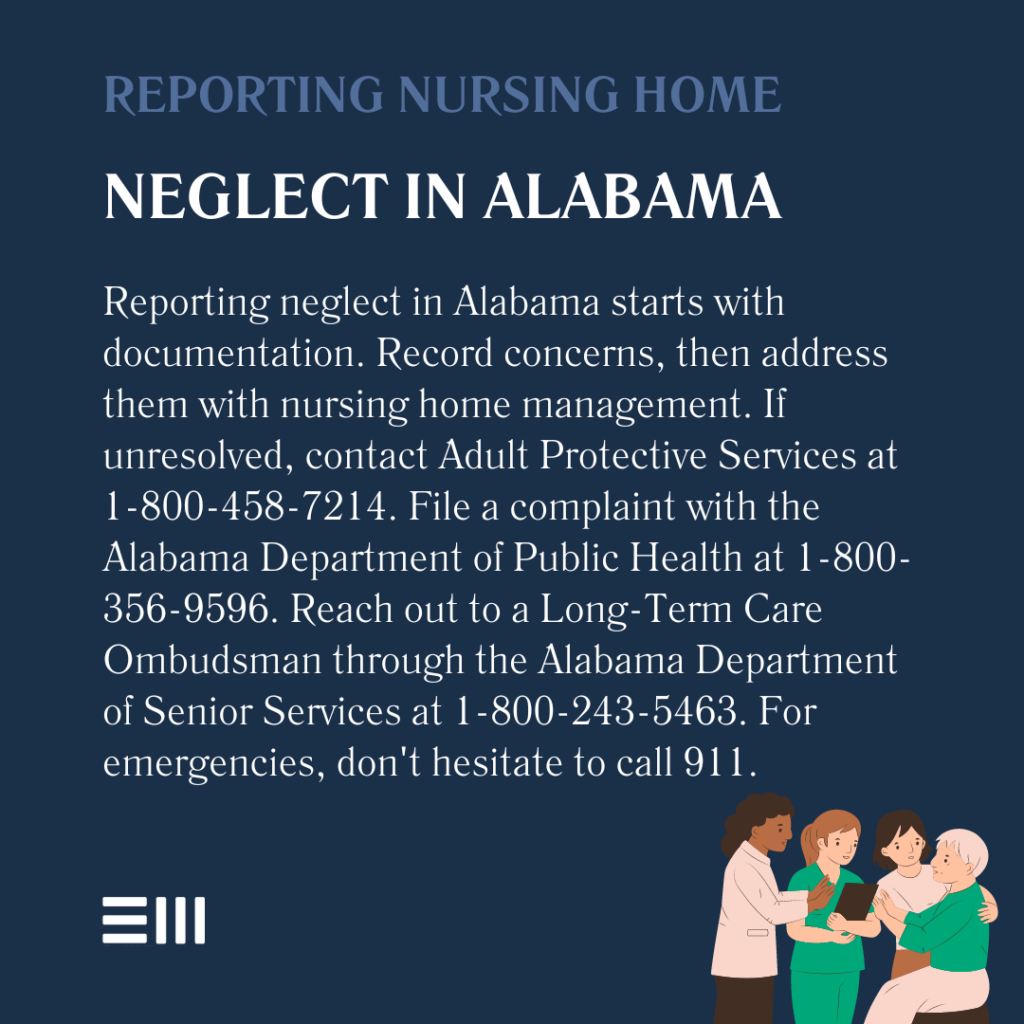
Over 40% of nursing home residents have reported abuse, and more than 90% report that they or another resident have experienced neglect.
In Alabama, where over 25,000 residents live in nursing homes, it’s crucial to be vigilant and informed about the signs of neglect, proper reporting procedures, and available legal actions.
Understanding Nursing Home Neglect
Nursing home neglect is a form of elder abuse that occurs when caregivers fail to provide proper care, leading to harm or the risk of harm to a resident.
Unlike active abuse, neglect is often characterized by the absence of necessary care. In Alabama, as in other states, nursing homes have a legal and ethical obligation to provide a standard of care that ensures the health, safety, and well-being of their residents.
Neglect can manifest in various forms, including:
- Physical neglect: Failure to provide basic needs such as food, water, or hygiene assistance;
- Medical neglect: Inadequate attention to health issues or medication management;
- Emotional neglect: Lack of social interaction or emotional support; and
- Financial neglect: Mismanagement of a resident’s finances or resources.
Understanding these forms of neglect is the first step in protecting vulnerable nursing home residents and ensuring they receive the care they deserve.
Recognizing the Signs of Nursing Home Neglect
Identifying nursing home neglect can be challenging, especially if your loved one has difficulty communicating.
However, being aware of the common signs can help you detect potential problems early. Here are key indicators to watch for:
Physical Signs of Neglect
- Unexplained weight loss or dehydration;
- Bedsores or pressure ulcers;
- Poor personal hygiene or unclean living conditions;
- Untreated injuries or medical conditions; and
- Frequent falls or accidents.
Behavioral and Emotional Signs
- Sudden changes in behavior or mood;
- Withdrawal from activities or social interactions;
- Signs of fear or anxiety around certain staff members;
- Depression or apathy; and
- Unusual sleep patterns or insomnia.
Environmental and Situational Signs
- Unsanitary living conditions;
- Lack of mobility aids or assistive devices;
- Medication errors or inconsistencies;
- Frequent staff turnover or inadequate staffing; and
- Restricted family visits or communication.
It’s important to note that while these signs can indicate neglect, they may also be symptoms of other issues.
Regular visits and open communication with your loved one and the nursing home staff are crucial for accurate assessment.

Reporting Nursing Home Neglect in Alabama
If you suspect nursing home neglect, it’s essential to take action promptly. Alabama has specific procedures and resources for reporting elder abuse and neglect.
Here’s a step-by-step guide on how to report nursing home neglect in the state:
- Document your concerns: Keep a detailed record of any signs or incidents of neglect, including dates, times, and descriptions.
- Report to the nursing home administration: Start by addressing your concerns with the nursing home’s management or administrator. They should have protocols in place to address and resolve issues.
- Contact Alabama’s Adult Protective Services (APS): If the situation is not resolved or if you believe your loved one is in immediate danger, report to APS. Call their 24/7 hotline at 1-800-458-7214 or report online through the Alabama Department of Human Resources website.
- File a complaint with the Alabama Department of Public Health: You can file a formal complaint about a nursing home by calling 1-800-356-9596 or submitting a complaint form online.
- Reach out to the Long-Term Care Ombudsman Program: Ombudsmen advocate for nursing home residents and can investigate complaints. Contact the Alabama Department of Senior Services at 1-800-243-5463 to connect with your local ombudsman.
- Consider law enforcement involvement: If you suspect criminal neglect or abuse, contact your local police department or call 911 in emergencies.
Remember, reporting neglect is not just a right but a responsibility. Your action could prevent further harm and protect other residents as well.

Legal Actions for Nursing Home Neglect
When nursing home neglect occurs, legal action may be necessary to protect the rights of the resident and seek justice. In Alabama, there are several legal options available:
Civil Lawsuits
Victims of nursing home neglect or their families can file a civil lawsuit against the nursing home. These lawsuits typically seek compensation for:
- Medical expenses;
- Pain and suffering;
- Emotional distress; and
- Wrongful death (in severe cases).
Regulatory Actions
The Alabama Department of Public Health can take regulatory actions against nursing homes that violate state standards. These may include:
- Fines and penalties;
- Mandated corrective action plans; and
- License suspension or revocation.
Criminal Prosecution
In cases of severe neglect or intentional harm, criminal charges may be filed against individual staff members or the nursing home facility.
Statute of Limitations
It’s important to note that Alabama has a statute of limitations for nursing home neglect cases.
Generally, you have two years from the date of the injury (or from when the injury was discovered) to file a lawsuit. However, this can vary depending on the specific circumstances of the case.
Preventing Nursing Home Neglect
While understanding how to recognize and report neglect is crucial, prevention is always the best approach.
Here are some strategies to help prevent nursing home neglect:
- Research and choose nursing homes carefully;
- Visit regularly and at different times of the day;
- Stay involved in your loved one’s care plan;
- Build relationships with staff members;
- Educate yourself about residents’ rights; and
- Advocate for better staffing ratios and training in nursing homes.
By staying vigilant and involved, you can play a significant role in ensuring the safety and well-being of your loved one in a nursing home setting.
Frequently Asked Questions About Nursing Home Neglect
As you navigate the complex issue of nursing home neglect, you likely have many questions. Here are answers to some of the most common inquiries we receive about nursing home neglect in Alabama.
What Is Considered Nursing Home Neglect?
Nursing home neglect occurs when a facility fails to provide proper care, resulting in harm or risk of harm to residents.
This can include inadequate nutrition, poor hygiene, lack of medical care, or failure to prevent accidents.
How Common Is Nursing Home Neglect in Alabama?
While exact statistics are challenging to determine due to underreporting, studies suggest that neglect is unfortunately common in nursing homes nationwide, including in Alabama.
The state’s Department of Public Health regularly investigates complaints and citations related to neglect.
What Should I Do if I Suspect Neglect?
If you suspect neglect, document your observations, report your concerns to the nursing home administration, and contact Alabama’s Adult Protective Services.
Consider reaching out to a Long-Term Care Ombudsman or consulting with an elder law attorney for guidance.
Can I Sue a Nursing Home for Neglect?
Yes, you can sue a nursing home for neglect in Alabama. However, these cases can be complex, and it’s advisable to consult with an experienced elder law attorney to understand your options and the strength of your case.
How Can I Prove Nursing Home Neglect?
Proving neglect often requires thorough documentation, including medical records, photographs of injuries or conditions, witness statements, and expert testimony.
An experienced attorney can help gather and present this evidence effectively.
What Compensation Can Be Recovered in a Nursing Home Neglect Case?
Compensation in nursing home neglect cases may include medical expenses, pain and suffering, emotional distress, and, in some cases, punitive damages. The specific amount depends on the severity of the neglect and its impact on the resident.
How Long Do I Have to File a Nursing Home Neglect Lawsuit in Alabama?
In Alabama, the statute of limitations for nursing home neglect cases is generally two years from the date of injury or discovery of the injury.
However, certain circumstances may affect this timeline, so it’s best to consult with an attorney as soon as possible.
Protecting the Vulnerable: Your Next Steps
If you’re concerned about a loved one in a nursing home or have questions about potential neglect, don’t hesitate to seek help.
Our experienced team at Baxley Maniscalco is here to guide you through the process, protect your loved one’s rights, and ensure they receive the care and respect they deserve.
Don’t let your loved one suffer in silence. If you suspect nursing home neglect or have concerns about the care your family member is receiving, contact Baxley Maniscalco today.
Can't find what you're looking for? Search our site below.










